
Practice Perfect 800
Practice Perfect 800!
Practice Perfect 800!
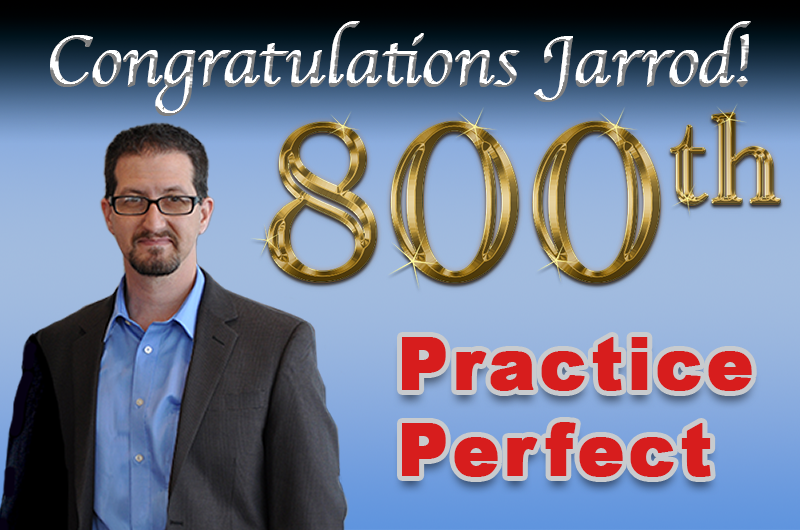
Welcome to our 800th Practice Perfect! These editorials started in 2006 when I was a senior resident with its first incarnation, Residency Rap. We changed the name to New Doc on the Block when I started practice and finally merged into Practice Perfect as I became too experienced to say I was a new doc. Eighteen years and 800 posts later, here we are. I’ve been incredibly lucky to work with the wonderful team at PRESENT e-Learning Systems and privileged to have the chance to speak with all of you every Tuesday.
To celebrate the editorial, let’s survey each of the centennial Practice Perfects, a representational survey of what I’ve written about in the past 18 years. Sometimes it’s informative and educational to look back on the past.

Practice Perfect 1 – The Classes. I can’t help but start with the first editorial – at least the first Practice Perfect. At the time I wrote this, I was 13 years younger, had started my second job in Oregon, and waxed poetic about social differences between various members of the medical community. I was saddened by social divisions that limited our interactions, much to our loss. A number of years later, I have to say this hasn’t changed all that much. Perhaps it’s even worse now that I teach at a podiatric medical college. There are so many more social levels now: students of different years, residents, medical assistants, professors of various levels, administrators, deans, and university staff, not to mention all those at the hospitals and surgery centers. I maintain the “Dr Shapiro” name rather than “Jarrod” since I have to remain an authority, and it becomes very difficult for others to call me by the familiar. Even after my residents graduate, and I invite them to call me by first name, some of them just can’t do it. It’s wonderful to build long-term relationships and watch people grow, but it seems this classicism is part of human society that isn’t going anywhere.

Practice Perfect 100 - Relocation. This editorial was actually written after number 1 above because I was still a “New Doc on the Block.” At the time I wrote this, I had just joined Mountain View Medical and Surgical Associates in Madras, Oregon. I spent a wonderful two years in this beautiful part of Central Oregon, living in a town of 6,500 people. The practice was never busy, but I learned a ton, and the people I worked with were so special. The editorial itself gave advice about moving and relocating to a new location. My wife, 3-year-old son (who’s now almost 17 years old – wow, the time goes fast!), and I moved from Michigan to Oregon, one of our many moves (we’ve moved a total of 17 times between college up to present day). The advice then, as it does today, remains reasonable: be organized and give yourself plenty of time when doing any move.
Practice Perfect 200 – Health Fairs. While living in Oregon and trying to build a practice, I spent a good bit of time marketing, which included talking to groups and attending health fairs. I apparently was also enjoying being a voyeur, listening in on other people’s conversations and enjoying the absolutely ridiculous foot care advice people were giving each other. I also gave some advice on things to bring with you to an event. As is true today, you’ll spend most of your time educating people (and hopefully building patient volume), but isn’t that always true in medicine? It seems I spend the vast majority of my patient time either listening to patients or educating them about various aspects of their care. How much do people really listen? Well, as a case in point, I sent a patient to the hospital just yesterday, spending extra time to send them to a specific hospital to see a specific doctor, and what did they do? You guessed it. They went to a totally different hospital. Oh well…educate on my friends!
Practice Perfect 300 – Origins. This was actually part two of a short series in which the discussion revolved around the questionable use of some of our examination methods, a topic I’ve been invested with for some time. I discussed the problematic nature of the Silfverskiöld test, which was not invented for the purpose we use it today, and it was his original article that led me down a path of investigation that proved to me that gastrocnemius equinus is not actually a pathological process. I’ve lectured nationally on this topic and even wrote a paper with Benjamin Kamel, one of my former residents. I know it sounds heretical, but if you read it with an open mind, you just might see it’s a reasonable opinion.1
Practice Perfect 400 – Reflections on 15 Years. I wrote this editorial when I was in the profession (education + 8 years of practice) for 15 years. At this point, I’m firmly ensconced at Western University, teaching our next generation of students (Lord help them!). Halfway to today, I gave five pieces of advice that I would argue remain as valid today as they were back then: don’t procrastinate, maximize your training, network, be critical, and enjoy those around you. Sometimes that last one can get lost in the daily grind trying to accomplish the other four, but when you look at it, much of our lives are really about relationships with other people. Interactions with friends and loved ones are some of the deepest and rewarding of our lives.
Practice Perfect 500 - Thought Process – Key to Our Development as Physicians. I advocated then, as I do now, that, as physicians, our minds are our most important tool, but as time goes by, I’m often surprised at how this tool of ours fails so stupendously. Each of us in practice sees some number of patients who had a failed surgery that boiled down to some failure of judgement or procedure choice rather than technical execution. Have you ever wondered why there are almost no articles in the literature about how to make surgical decisions? We also spend almost no time giving our students frameworks for making treatment decisions. For example, my students diagnose plantar fasciitis easily, but when I ask them to state risk factors for this diagnosis and apply those risk factors to treatment, I receive blind looks. This was the primary reason I invented the kineticokinematic (KK) approach to decision-making: use a simple method to guide treatment decisions both nonsurgically and surgically (Practice Perfect 668). Thought process is the single most important topic in lower extremity medicine with the least focus and attention. So much more work needs to be done to repair this!
Practice Perfect 600 – Ideas. It would probably be strange for someone spending so much time writing editorials online to not be enamored with concepts and ideas. I love ideas. I’m excited when I hear something I didn’t know before. I especially love learning about something I didn’t know that I didn’t know. Whether it’s equinus isn’t pathological or albumin is not a marker of nutrition (no, it’s really not-read Practice Perfect 643) or superconstructs in Charcot surgery or any of a thousand other ideas, they have the power to change our perspectives and modify our actions in ways previously unrecognized. However, we must be open-minded enough to allow them to change our minds.
Practice Perfect 699 - COVID-19: Revealing Strengths and Weaknesses. It’s an anthropological and historical statement at this point to say we couldn’t avoid the encroachment of the COVID-19 pandemic into this editorial. The painful part about this is that the pandemic was already raging for some time when I wrote #699, and here we are about 100 editorials and 2 years later still dealing with it. COVID-19 has opened our eyes to painful weaknesses and inequities in our social and medical systems, but it’s also shown us the deep courage of the heroes working literally for years on the front lines of this disaster to save one life at a time. While some of us got to work from the comfort of our homes, others labored in a battlefield of disease to keep us safe and alive. How this pandemic will change our society going forward is anyone’s guess, but like all historic social change, it will be profound.
Today, on Tuesday, March 8th, 2022, as Practice Perfect 800 flies through the ether to invade your email inboxes, I can say with no sense of irony that writing these editorials every week for 18 years has been an eye-opening labor of love and one of the most amazing privileges of my personal and professional life. A personal privilege because I’ve been lucky enough to meet so many special people, from the amazingly patient team at PRESENT e-Learning Systems (no one will ever know just how patient these folks are working with me every week!) to every one of you, new friends and colleagues expanding my mind with your own stories and impressions. Thank you all for reading, commenting, and debating all the various aspects of our important podiatric profession. My life would have been dull without the opportunity to Practice Perfect.
Best wishes.

Jarrod Shapiro, DPM
PRESENT Practice Perfect Editor
[email protected]

-
Shapiro J, Kamel B. Passive Muscular Insufficiency: The Etiology of Gastrocnemius Equinus. Clin Podiatr Med Surg. 2020 Jan;37(1):61-69.
Follow this link

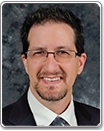



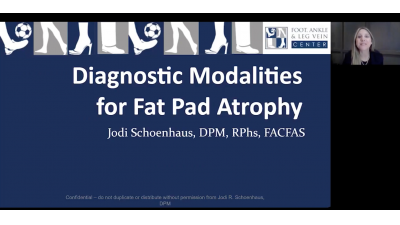
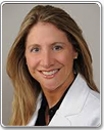


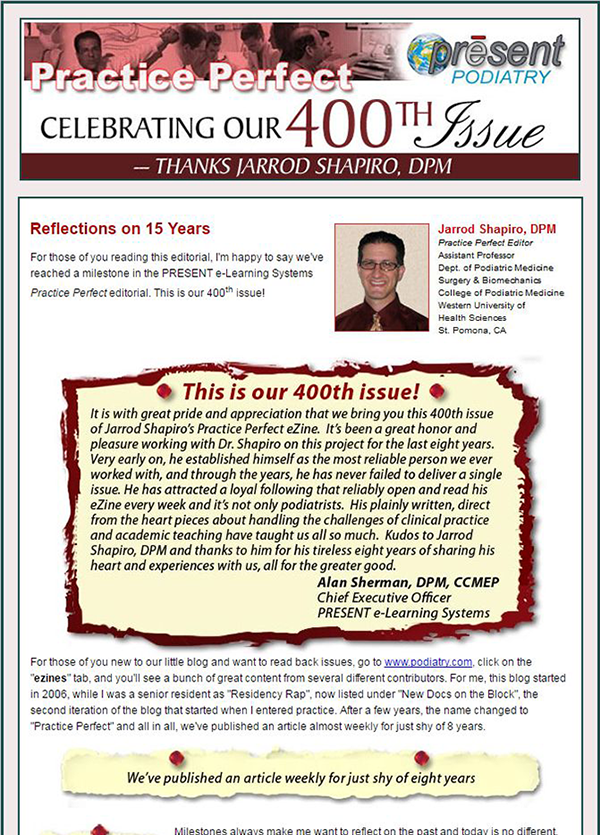

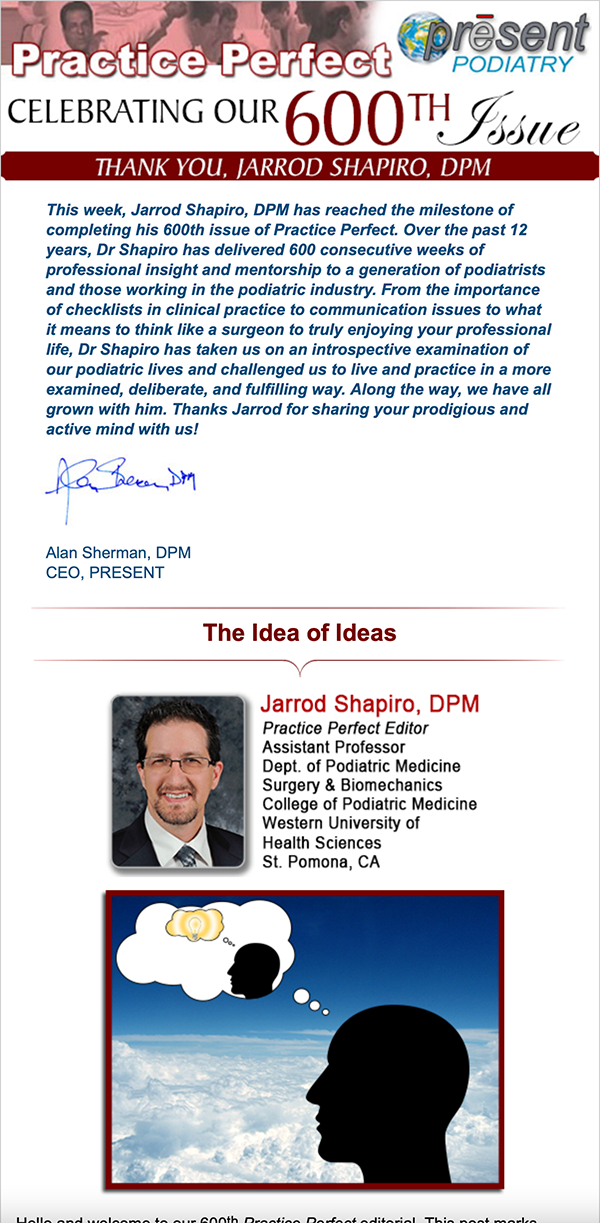


























Comments
There are 0 comments for this article